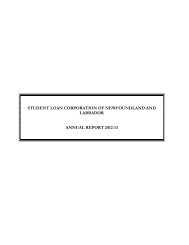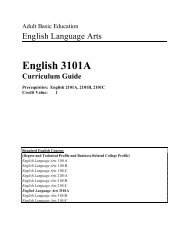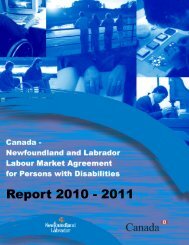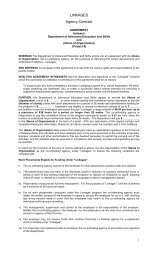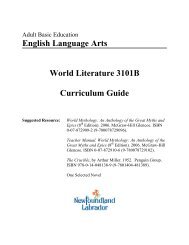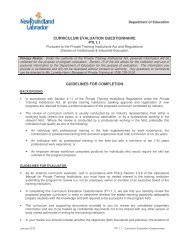2004-2005 Youth Advisory Committee Annual Report
2004-2005 Youth Advisory Committee Annual Report
2004-2005 Youth Advisory Committee Annual Report
Create successful ePaper yourself
Turn your PDF publications into a flip-book with our unique Google optimized e-Paper software.
The Path Ahead<strong>Annual</strong> <strong>Report</strong><strong>2004</strong>-05
Provincial <strong>Youth</strong> <strong>Advisory</strong> <strong>Committee</strong>ANNUAL REPORT <strong>2004</strong>-05Honourable Harvey Hodder, M.H.A.SpeakerHouse of AssemblyDear Mr. Speaker:I am pleased to submit the <strong>Annual</strong> <strong>Report</strong> for the Provincial <strong>Youth</strong> <strong>Advisory</strong><strong>Committee</strong> which details the <strong>Committee</strong>’s activities from April 1, <strong>2004</strong> to March31, <strong>2005</strong>.The Provincial <strong>Youth</strong> <strong>Advisory</strong> <strong>Committee</strong> has been an invaluable asset inhelping government develop programs and policies which address the issuesfacing the youth of our province.Respectfully submitted,Paul ShelleyMinisterHuman Resources, Labour and Employment
The <strong>Youth</strong> <strong>Advisory</strong> <strong>Committee</strong> would sincerely like to thank the Department ofHuman Resources, Labour and Employment for the opportunity to representyouth on such a unique and worthwhile committee. Because of theDepartment’s support, we have a voice in much of the positive changes foryouth in our province. It is truly an honour to work with other youth who havesuch a passion and a sense of duty to fellow youth in our province.<strong>2004</strong>-05 <strong>Youth</strong> <strong>Advisory</strong> <strong>Committee</strong>
Table of ContentsThis document was produced solely by the <strong>Youth</strong> <strong>Advisory</strong> <strong>Committee</strong> with supportfrom the Department of Human Resources, Labour and EmploymentHighlights Page 1Introduction Page 2Achieving Our Mandate Page 3Recommendations Page 6Conclusion Page 10AppendicesA. Terms of ReferenceB. Member/Mentor BiographiesC. Newfoundland & Labrador Fact SheetD. List of Persons/Agencies ConsultedPage 11Page 13Page 15Page 16Newfoundland and Labrador <strong>Youth</strong> <strong>Advisory</strong> <strong>Committee</strong>P.O. Box 8700St. John’s, NLA1B 4J6phone: 709.729.6890email: yac@gov.nl.cahttp://www.gov.nl.ca/yac/
<strong>Annual</strong> <strong>Report</strong> <strong>2004</strong>-05Highlights The <strong>Youth</strong> <strong>Advisory</strong> <strong>Committee</strong> identified three priority issues for <strong>2004</strong>-05:• Rural Options• Healthy Choices• Social Decisions• The <strong>Youth</strong> <strong>Advisory</strong> <strong>Committee</strong> participated in “Focusing on our Future: APartnership in Rural Development,” hosted by Mariner Resource OpportunitiesNetwork Inc. (M-RON Inc.).• The <strong>Youth</strong> <strong>Advisory</strong> <strong>Committee</strong> met with the Premier, the Minister of HumanResources, Labour and Employment and the Social Policy <strong>Committee</strong> to discussGovernment’s response to the recommendations presented in the <strong>Committee</strong>’s2003-04 report.The <strong>Youth</strong> <strong>Advisory</strong> <strong>Committee</strong> discussed youth issues, separately, with thefollowing Senior Government Officials:• Premier Danny W illiams• Hon. Joan Burke, Minister of Human Resources, Labour and Employment• Mr. Ross Reid, Program Renewal Secretariat• Ms. Alison Earle, Rural Secretariat• Ms. Karen Alexander, Department of Human Resources, Labour andEmploymentThe <strong>Youth</strong> <strong>Advisory</strong> <strong>Committee</strong> held meetings in Labrador, Southern, andEastern Newfoundland.The <strong>Youth</strong> <strong>Advisory</strong> <strong>Committee</strong> met with many agencies and organizations,some of which include: the Labrador W est <strong>Youth</strong> Centre Board, Futures inNewfoundland and Labrador’s <strong>Youth</strong>! (FINALY!), and Memorial University ofNewfoundland and Labrador Students’ Union (MUNSU).1
<strong>Annual</strong> <strong>Report</strong> <strong>2004</strong>-05IntroductionAs members of the <strong>Youth</strong> <strong>Advisory</strong> <strong>Committee</strong>, we are pleased and proud to presentour third <strong>Annual</strong> <strong>Report</strong> to the Minister of Human Resources, Labour and Employment.“Government must continue withthe campaign regarding abuse ofnarcotics. Highly addictive anddangerous narcotics are prevalentand have intertwined themselveswithin our society. I feel thataction should be continued as it isnecessary in preventing youthfrom developing lethal habits.”Robyn Frampton, CarbonearThis has been another busy and exciting year forthe <strong>Committee</strong>. W e:• continued to work within our ‘flat’organizational structure in which allmembers are equal participants and treateach other with respect;• used a strategic approach to identify andtackle the issues facing the youth of ourprovince;• undertook research andconsultations on a wide rangeof issues;• held regional meetings inLabrador City, Grand Bank, andSt. John’s and visited withlocal groups to discuss topicsof mutual interest; and• maintained ongoingcommunications with the Minister, departmental officials and Government’sliaison committee.Alison Earle, ADM, Rural Secretariat and<strong>Committee</strong> member Susan Taylor2
<strong>Annual</strong> <strong>Report</strong> <strong>2004</strong>-05Achieving Our MandateThe Provincial Government established the <strong>Youth</strong><strong>Advisory</strong> <strong>Committee</strong> in June 2001 to provide a forum “I feel that sex educationfor the ‘open discussion of key issues affecting the should begin at a young age asthis is the best way to assist inyoung people of Newfoundland and Labrador’ and toprevention. Young peopleadvise the departments responsible for youth servicesneed to feel they can talkand education on Government’s youth-relatedabout sex with their teachersprograms and policies.as this is important when theyhave nobody else to talk to.”The names of members of the <strong>Youth</strong> <strong>Advisory</strong><strong>Committee</strong> were announced on September 7th, 2001Susan Taylor, St. John’sand the first organizational meeting was held that day.In September of 2003, new members were added to the committee to replace thosewhose terms were completed (Appendix A). Six new members will be added in <strong>2005</strong> tofill the vacancies. This will be done by a public call for applications at which time theMinister will select the six new members.A Terms of Reference was adopted in 2003 which outlines our structure, theappointment of members, our responsibilities as members of the <strong>Youth</strong> <strong>Advisory</strong><strong>Committee</strong>, the role of our mentors, and the conduct of our meetings, among otherinitiatives (Appendix B).Throughout this past year, we weresuccessfully able to undertake ourtwo primary roles; (1) to discussyouth-related issues, and (2) toadvise the Minister on possiblechanges in provincial programs andpolicies affecting our generation.In order to address the many issuesRoss Reid, Deputy Minister responsible for Program Renewalwe feel are outstanding, we focuson three main categories of issues per year. Last year, we focused on the threestrategic categories of Alternate Education, Supportive Services, and HealthyLifestyles.3
<strong>Annual</strong> <strong>Report</strong> <strong>2004</strong>-05This year, our three strategic categories are:Rural OptionsUnder this category, the <strong>Youth</strong> <strong>Advisory</strong> <strong>Committee</strong> focuses on issues relating toaccessing programs and services in rural areas of Newfoundland and Labrador.Particularly, the <strong>Committee</strong> discusses the availability of information with regard tomaking viable career decisions, the cost of attending post-secondary for those living inrural communities, accessing schools for community use, the introduction of the RuralSecretariat, and the importance of long-term plans for sustainability of ruralcommunities.Healthy ChoicesUnder this category, the <strong>Youth</strong> <strong>Advisory</strong> <strong>Committee</strong> continues to explore opportunitiesfor youth to lead healthy lifestyles and increase the availability of health programs andservices. The <strong>Committee</strong> feels implementing recommendations contained in theOxycontin Task Force <strong>Report</strong>, controlling the amount of available illegal narcotics andthe accessibility of tobacco, providing Occupational Health & Safety (OH&S) training,increasing the amount of healthy nutrition in schools, and increasing youth activitythrough reinvesting in recreation infrastructure as well as increasing the skill set ofrecreational professionals would assist in combating the problems facing our provinceas it relates to healthy choices.Social DecisionsUnder this category, the <strong>Youth</strong> <strong>Advisory</strong> <strong>Committee</strong>“Increasing the distribution ofdiscusses various options to assist youth in making information to youth in theinformed social decisions. Specifically, theprovince will enable us to make<strong>Committee</strong> discusses increasing the information informed decisions which willavailable regarding the Student Financial Aidbenefit the province as a whole.”process, becoming more creative in using the IncomeSarah Arnott, St. John’sSupport Program, evaluating minimum wage on acontinual basis, reducing barriers faced by singleparents, working collaboratively to meet the needs ofyouth who are between the ages of 12 – 18 years,and the importance of the early identification ofissues in an effort to become better prepared in our province.4
<strong>Annual</strong> <strong>Report</strong> <strong>2004</strong>-05Over the course of this past year, we collected information and consulted widely onthese themes. However, these are not the only topics we covered in our discussions.W e expect to re-assess our priorities on an ongoing basis as other, more critical,issues are before us.In the meantime, through our efforts, we were able to suggest realistic options forseveral key policy matters under active consideration by the Provincial Governmentthroughout the past year. W e will now turn to these and other matters in detail.5
<strong>Annual</strong> <strong>Report</strong> <strong>2004</strong>-05RecommendationsThe <strong>Youth</strong> <strong>Advisory</strong> <strong>Committee</strong> has developed the following series of recommendationsbased on our deliberations and activities over the past year:1. The <strong>Youth</strong> <strong>Advisory</strong> <strong>Committee</strong> feels the following recommendations are realisticRural Options:A. Government should consult industry leaders in developing a vehicle to provideinformation regarding the current and future state of the fishing industry for thepurpose of allowing youth to make viable career decisions within the fishingindustry.B. The <strong>Youth</strong> <strong>Advisory</strong> <strong>Committee</strong> recommends that schools be available tocommunity organizations to provide opportunities for community extracurricularactivities outside of regular secondary school hours. It is important for thecommunity that schools be available in all areas of the province, especially inrural communities.C. An education travel grant should be available for every post-secondary studentin the province to defer the cost of travel to and from a student’s permanentresidence and the institution. The allotment of the grant should be individuallyassessed and based on the permanent residence of the student and the cost oftravel. This grant shall be allotted regardless of whether a student loan isrewarded. In the case that a student is issued a loan, this grant shall notinterfere with the calculation of student loan money for which the student iseligible.D. The <strong>Youth</strong> <strong>Advisory</strong> <strong>Committee</strong> congratulates Government on the introductionand implementation of the Rural Secretariat. The Rural Secretariat shouldconsult with the <strong>Youth</strong> <strong>Advisory</strong> <strong>Committee</strong> on a continuous basis to ensureyouth voices are a part of the Rural Secretariat as they move forward with theirgoals, objectives, and initiatives.6
<strong>Annual</strong> <strong>Report</strong> <strong>2004</strong>-05E. The <strong>Youth</strong> <strong>Advisory</strong> <strong>Committee</strong> is concerned with the lack of a long-term planaimed at sustaining rural communities ensuring rural communities have accessto programs and services.2. The <strong>Youth</strong> <strong>Advisory</strong> <strong>Committee</strong> feels the following recommendations will provideHealthy Choices for the youth of our province:A. The <strong>Youth</strong> <strong>Advisory</strong> <strong>Committee</strong> applauds Government for completing theOxycontin Task Force <strong>Report</strong> and feels it is a priority for the recommendationsin this report to be actioned. Specifically, it is necessary to develop acentralized patient database, for use by doctors and pharmacists, to monitor theuse and abuse of Oxycontin and similar drugs.B. The <strong>Youth</strong> <strong>Advisory</strong> <strong>Committee</strong> recommends that the Department of Justice takeaction to strengthen laws, increase resources, and introduce an improvededucation process to address the availability of illegal narcotics in communitiesand their detrimental effects on youth in our province.C. The <strong>Youth</strong> <strong>Advisory</strong> <strong>Committee</strong> applauds Government on the legislationpreventing smoking in public facilities. However, it is essential to continue todevelop legislation to prevent youth from developing an addiction to smoking.Currently, it is illegal for youth below the age of 19 years to purchase tobaccoand tobacco products. The <strong>Youth</strong> <strong>Advisory</strong> <strong>Committee</strong> recommends thatGovernment also make it illegal for youth below the age of 19 to use tobaccoproducts.D. The <strong>Youth</strong> <strong>Advisory</strong> <strong>Committee</strong> applauds Government on its contributions to theSchool Lunch Association. However, it is necessary for these programs to beavailable to youth in all schools in the province. Government should alsoconsider developing a similar program available to youth in programs during thesummer months.E. The <strong>Youth</strong> <strong>Advisory</strong> <strong>Committee</strong> feels that Occupational Health & Safety (OH&S)training is a necessity in all youth employment and would like to see mandatoryOH&S training as part of any youth employment and be provided by theGovernment.7
<strong>Annual</strong> <strong>Report</strong> <strong>2004</strong>-05F. Government should reinvest in recreational infrastructure to combat theincreasing problem of the age of recreational facilities, which in turn wouldcombat the issues around youth inactivity.G. The <strong>Youth</strong> <strong>Advisory</strong> <strong>Committee</strong> recommends that the Department of Tourism,Culture and Recreation as well as the Newfoundland and Labrador Parks andRecreation Association (NLPRA) work together to develop a series ofprofessional development certifications for recreation professionals in theprovince. These certifications can be carried out through the public postsecondaryinstitutions. It is believed that these certifications will increased theskill set of recreational professionals and increase their ability to offer qualityprograms to youth and the community at large.H. The <strong>Youth</strong> <strong>Advisory</strong> <strong>Committee</strong> recommends that the Department of Tourism,Culture, and Recreation take a lead role in reviewing and implementing thestrategies identified in the 2002 report entitled, Regaining Our Health.3. The <strong>Youth</strong> <strong>Advisory</strong> <strong>Committee</strong> feels the following recommendations will preparethe youth of the province to make good Social Decisions:A. Increased education is needed within the secondary and post-secondarysystems concerning the Student Financial Aid process and the impact studentloans have on graduates. Government must ensure that students are betterinformed and aware of the financial aid process (e.g. acquiring a loan,repayment process, appeals process, etc.) as well as other financialopportunities or grants.B. The <strong>Youth</strong> <strong>Advisory</strong> <strong>Committee</strong> recommends that the Department of HumanResources, Labour and Employment be creative in using its Income SupportProgram, specifically targeted at youth, to enhance their educational andemployment opportunities.C. The <strong>Youth</strong> <strong>Advisory</strong> <strong>Committee</strong> recommends that Government continue toevaluate the minimum wage and strive to make it equal to the minimum wage inother provinces of Canada. It is also recommended that financial support toyouth employment programs increase accordingly to reflect the increase in theminimum wage.8
<strong>Annual</strong> <strong>Report</strong> <strong>2004</strong>-05D. Government should continue to introduce and implement supports, such asthose offered by the Single Parents Association of Newfoundland and Labrador,which are designed to support single parents who want to work but face socialand economic barriers.E. The <strong>Youth</strong> <strong>Advisory</strong> <strong>Committee</strong> is concerned with the availability andaccessibility of programs and services targeted towards youth, ages 12 – 18years. As youth are facing many social barriers towards accessing educationand employment, it is necessary for government and community agencies toprovide enhanced programs and services in partnership and consultation withthe Department of Education, Department of Justice, Department of Health andCommunity Services, and the Department of Human Resources, Labour andEmployment. It is also necessary that programs and services reflect the realsocial barriers faced by youth in our province.F. Government should be more proactive in monitoring social issues in otherprovinces for the purpose of utilizing an increased preventative approach todealing with potential issues in the province of Newfoundland and Labrador.The <strong>Youth</strong> <strong>Advisory</strong> <strong>Committee</strong> feels that the early identification of issues, suchas Oxycontin abuse, could lead to better preparedness throughout our province.4. The <strong>Youth</strong> <strong>Advisory</strong> <strong>Committee</strong> also offers some additional recommendations:A. The <strong>Youth</strong> <strong>Advisory</strong> <strong>Committee</strong> recommends continued consultation withGovernment throughout the Program Renewal process.B. Government should implement a process for evaluating its partnership with notfor-profitorganizations to ensure elimination of duplication of services and thatgaps in services are addressed. The <strong>Youth</strong> <strong>Advisory</strong> <strong>Committee</strong> feels it isnecessary for Government to increase partnerships with not-for-profits in theprovince of Newfoundland and Labrador.C. The <strong>Youth</strong> <strong>Advisory</strong> <strong>Committee</strong> encourages Government to revisit therecommendations contained in the Royal Commission <strong>Report</strong> entitled,Strengthening Our Place in Canada, particularly in reference to our culturalheritage.9
<strong>Annual</strong> <strong>Report</strong> <strong>2004</strong>-05D. The <strong>Youth</strong> <strong>Advisory</strong> <strong>Committee</strong> endorses the recommendations from the WhitePaper on Public Post-Secondary Education in Newfoundland and Labrador andencourages Government to expedite the development of thoserecommendations. The <strong>Committee</strong> feels that affordable and accessible postsecondaryeducation as well as enhanced employment prospects for graduatesis extremely important issues facing our youth today. The implementation ofthese recommendations will help combat these issues.ConclusionThe <strong>Youth</strong> <strong>Advisory</strong> <strong>Committee</strong> has gained thereputation of a key organizational structure by offeringmeaningful advice to the Minister of Human Resources,Labour and Employment as well as other governmentagencies on youth programs and policies. The solidrecommendations outlined in this report are the result oftireless efforts given by the <strong>Youth</strong> <strong>Advisory</strong> <strong>Committee</strong>members. The dedicated commitment as volunteers hasexemplified our sense of obligation to the province’syouth and the policies and programs by which they aregoverned."A youth's education is apowerful thing, having theability to either hinder ordevelop a future. Everyonedeserves a fair and equalchance at this opportunity inlife, and where we choose tolive should not influence thatopportunity. Whether urbanor rural, communitiesdeserve the right to fair andequal education."W e are very appreciative of the Department of HumanJacenta Smith, RaleighResources, Labour and Employment as well asGovernment of Newfoundland and Labrador for valuing our input, seeking furtherdiscussions, and most importantly, providing much needed support. W e have beenvery successful in the past in identifying as well as discussing issues related to youth.Given the opportunity and resources, we very much anticipate another productive yearin assisting the Department of Human Resources, Labour and Employment and theGovernment of Newfoundland in designing and modifying policies and programs.W e thank the Minister and Provincial Government for providing us with an avenue todiscuss issues affecting the lives and well being of our peers.10
<strong>Annual</strong> <strong>Report</strong> <strong>2004</strong>-05Appendix A: Terms of ReferenceNEWFOUNDLAND AND LABRADOR YOUTH ADVISORY COMMITTEESPONSORING DEPARTMENT:Department of Human Resources, Labour and EmploymentSTRUCTURE:• fifteen (15) youth members and four (4) adult mentors;• youth members are between the ages of 15 – 29 years;• adult mentors are 29 years and above;• no less than two third (2/3) youth members and at least one (1) adult mentorwill constitute a quorum for a <strong>Committee</strong> meetingDURATION OF APPOINTMENT:The term of youth members will consist of two (2) or three (3) year terms. Ten (10)members of the <strong>Committee</strong> will serve for three (3) years and five (5) members willserve for two (2) years.The term of adult mentors will consist of two (2) mentors serving for three (3) yearsand two (2) mentors serving for two (2) years.APPOINTMENT OF MEMBERS:All youth members and adult mentors are appointed by the Minister of HumanResources, Labour and Employment in consultation with staff responsible for theoperations of the <strong>Committee</strong>.The selection of replacement members will be cognizant of many issues including:gender, regional location, ethnic representation, and other.REQUIREMENT OF MEMBERS:All youth members and adult mentors must make an effort to attend all <strong>Youth</strong> <strong>Advisory</strong><strong>Committee</strong> meetings and do the necessary preparation for each meeting.REMOVAL OF MEMBERS:If a member misses three (3) consecutive meetings without notifying the Department ofHuman Resources, Labour and Employment staff representative regarding theirinability to attend, the member may be replaced.RESPONSIBILITY OF YOUTH MEMBERS:1. attend all meetings (where possible);2. prepare for issues to be discussed;3. serve as a member of a sub-committee;4. participate as an equal member;5. a member leaving the province for more than six (6) months per year mustresign their position;6. a one-time leave of absence may be granted for up to six (6) months by theMinister of Human Resources, Labour and Employment.RESPONSIBILITY OF MENTORS:1. attend all meetings (where possible);2. prepare for issues to be discussed;3. serve as a member of a sub-committee;11
<strong>Annual</strong> <strong>Report</strong> <strong>2004</strong>-054. advise and direct the discussions and recommendations of the <strong>Committee</strong> as amember.MEETING RESPONSIBILITIES:The <strong>Youth</strong> <strong>Advisory</strong> <strong>Committee</strong>’s philosophy is that participation should be a learningexperience whereby ever member is given an equal opportunity in:Chairing of all meetings will be the responsibility of members, both youth and adults,in the host region for the meeting. The chair structure should be decided during thecompletion of the previous meeting.Recording of discussions is the responsibility of the Department of HumanResources, Labour and Employment staff representative at the meeting.Preparation of the agenda is the responsibility of the member(s) from the next hostregion with support from the Department of Human Resources, Labour andEmployment staff representative.Summary of each meeting will be compiled and distributed by the Department ofHuman Resources, Labour and Employment no longer than one (1) month after ameeting.Information pertaining to the next meeting will be distributed through the Departmentof Human Resources, Labour and Employment two (2) weeks prior to the next meetingdate.Travel arrangements and accommodations will be coordinated through the Departmentof Human Resources, Labour and Employment.YOUTH ADVISORY COMMITTEE ANNUAL REPORT:• the annual report will follow the standard structure for an annual report;• the completion of the report will be a reflection of the minutes from the <strong>Youth</strong><strong>Advisory</strong> <strong>Committee</strong>, along with direct recommendations and generaldiscussions;• the format for the presentation of the annual report and the exact content of thereport will be designed by a Sub-<strong>Committee</strong> of the <strong>Committee</strong> in conjunctionwith the Department of Human Resources, Labour and Employment staff.12
<strong>Annual</strong> <strong>Report</strong> <strong>2004</strong>-05Appendix B: Member/Mentor BiographiesSarah Arnott, St. John'sSarah graduated from Memorial University in 2002 with a Bachelor of Science degreein Computer Science. A former player with the Memorial University of Newfoundlandwomen's soccer team, she is currently a member of the coaching staff. She currentlyworks for Memorial University as a programmer analyst.Jamie Clements, Grand BankJamie is originally from Grand Bank on the Burin Peninsula of the province and nowmakes his home in St. John's. Jamie graduated from Memorial University with aBachelor of Science degree with a major in Geography. Jamie was a member ofMemorial University’s Students’ Union for several years and held the position of VicePresident Academic.Robyn Frampton, CarbonearRobyn graduated from the University of Ottawa with a Bachelor of Arts,Communications (Honours) in April 2002 and has since been employed with theRegional Economic Development Board (REDB), Mariner Resource OpportunitiesNetwork Inc. (M-RON Inc.) as a <strong>Youth</strong> Career Coach. Robyn is an active volunteerand has been a member of the <strong>Youth</strong> <strong>Advisory</strong> <strong>Committee</strong> since June 2003.Chris Hatcher, Grand BankChris is from Grand Bank and has been involved with many youth organizations andprograms over the past number of years. He volunteers on boards and committees,participates in open discussions and forums, and actively debates youth-relatedissues. Having successfully completed a Community Development program, he iscurrently finishing a three-year Programmer Analyst diploma at the College of theNorth Atlantic. W hen Chris is not participating in youth-related events, he is very busyrunning his own small IT consulting business, successfully putting his skills to workcreating his own job opportunity in our province.Dan Hill, SheshatshiuDan currently works as the Co-Director for Education for the Sheshatshiu Innu FirstNation in Sheshatshiu, Labrador. “My new job gives me more ways to help my ownpeople to better their lives, by helping them further education after high school," heexplains. The 28-year-old has a diploma in Microcomputer Service and NetworkSupport from Academy Canada and he has also studied at Memorial University from1994-1996.Joe McGrath, Bishop’s FallsJoe attended Acadia University studying Physical Education and majoring in SportManagement. He currently works for the Town of Bishop’s Falls as theRecreation/<strong>Youth</strong> Coordinator and has been involved with the <strong>Youth</strong> <strong>Advisory</strong><strong>Committee</strong> since June 2003.13
<strong>Annual</strong> <strong>Report</strong> <strong>2004</strong>-05Bronwyn Rideout, KippensBronwyn Rideout, of Stephenville, is in her final year of studies at MUN where she iscompleting her BA (Hons.) in Greek and Roman Studies. On campus she is an activemember of Burke House and Vice-President of the MUN Classics Society and offcampus she has taken the healthy lifestyles approach to heart and has competed inmany road races, including the <strong>2005</strong> Tely 10 Road Race.Jacenta Smith, RaleighJacenta is a third year nursing student at the Centre for Nursing Studies. Leading anactive volunteer life in a rural community, she has been involved in manyorganizations including the RCMP <strong>Youth</strong> <strong>Advisory</strong> <strong>Committee</strong> and the 774 St. AnthonyAir Cadet Squadron. Once finished her degree, Jacenta hopes to continue hervolunteering and spend time in similar worthwhile organizations.Susan Taylor, St. John’sSusan is a graduate of the Labour College of Canada making her the first woman fromthe United Food and Commercial W orkers (UFCW ) Union in Newfoundland andLabrador to graduate. She is presently employed at the Delta Hotel and ConferenceCentre and holds a Unit Chair position in her Local with the UFCW . An active memberwith her union, she is also a member of the Newfoundland and Labrador Federation ofLabour’s <strong>Youth</strong> <strong>Committee</strong>. In the past couple of years, Susan has participated invarious internships as a union representative and is well educated in areas dealingwith labour standards and human rights. She has worked extensively with the W orkersCompensation Board and has been involved in advising on the recent legislation forreturn to work programs. Susan believes that youth need a voice and is a veryenthusiastic member of this <strong>Committee</strong>.Beverley Kirby, Stephenville (Mentor)Beverley is the Director of the Community Education Network, a community-basedpartnership of agencies which provides an umbrella framework for learning projectsand programs in Southwestern Newfoundland. <strong>Youth</strong> initiatives have been a primaryfocus for the Network. Beverley has a background in education and communitydevelopment and holds Masters Degrees in Linguistics and Adult Education.14
Appendix C: Newfoundland & Labrador Fact Sheet<strong>Annual</strong> <strong>Report</strong> <strong>2004</strong>-05The outlined statistics have been compiled from Federal and Provincial Government agencies.Provincial <strong>Youth</strong> Population (15-29 years) 104,662% of Total Population 20.1%Out Migration:15 – 19 years -53220 – 24 years -895Paid Workforce (15 years and above) 241,500<strong>Youth</strong> Workforce (15-24 years) 35,595 (14.7%)Provincial Employment % 45.1%<strong>Youth</strong> Employment % 32.6%Provincial Unemployment % 21.8%<strong>Youth</strong> Unemployment % 33.1%% of Provincial Income Support Clients (15-29 years) 27.5%% of <strong>Youth</strong> in School (15-19 years) 62.3%High School Drop-out Rate (15-19 years) 11.5%Average Tuition (per year) $2,606.00Average Student Debt $20,400.00Post Secondary Completion:Memorial University of Newfoundland 80%College of the North Atlantic 1-2 Year Programs 65%3 Year Programs 50%<strong>Youth</strong> Without a High School Diploma Not Currently Enrolled in an Educational Program 12,497% of Total <strong>Youth</strong> Population 12.4%<strong>Youth</strong> Crime per 1000 youth (15-24 years) 36.4Teen Pregnancy per 1000 women (15-19 years) 32.7Induced Abortions per 1000 women (15-19 years):Total 7.5Hospital 2.9Clinic 4.6Attempted <strong>Youth</strong> Suicides per 1000 youth (15-19 years) 31% of <strong>Youth</strong> Dealing with a Mental Health issue (12-24 years) 20%15
Appendix D: List of Persons/Agencies Consulted<strong>Annual</strong> <strong>Report</strong> <strong>2004</strong>-05Person/Agency ConsultedTopic(s) CoveredPremier Danny WilliamsPresentation of the 2003 – <strong>2004</strong> <strong>Annual</strong> <strong>Report</strong>Minister Joan Burke (Department of HumanResources, Labour and Employment)Presentation of the 2003 – <strong>2004</strong> <strong>Annual</strong> <strong>Report</strong>Ms. Alison Earle (Rural Secretariat)Mr. Ross Reid (Program Renewal)Mr. Geoff Chaulk (Canadian Mental HealthAssociation)Social Policy <strong>Committee</strong>Mandate, goals, and objectives of the newlyestablished Rural SecretariatOverview of the Program Renewal process andfuture prospectsOverview of mandate, goals and initiatives, and adiscussion of mental health issues facing manyyouth in our provincePresentation of the 2003 – <strong>2004</strong> <strong>Annual</strong> <strong>Report</strong>Ms. Karen Alexander (Department of HumanResources, Labour and Employment)Dr. Wayne Ludlow (Department of Education)“Focusing on our Future: A Partnership in RuralDevelopment” (Mariner Resource OpportunitiesNetwork Inc. - M-RON Inc.)Overview of the Income Support ProgramIssues and concerns to be included in the WhitePaper on Public Post-Secondary Education inNewfoundland and LabradorPanel presentation regarding youth issues in ruralNewfoundland and LabradorLabrador West <strong>Youth</strong> Centre BoardIssues facing youth in LabradorFutures in Newfoundland and Labrador’s <strong>Youth</strong>!(FINALY!)Mandate, goals, objectives, initiatives, and issuesfacing youth in Newfoundland and LabradorMemorial University of Newfoundland and LabradorStudents’ Union (MUNSU)Issues facing post-secondary students inNewfoundland and Labrador16



